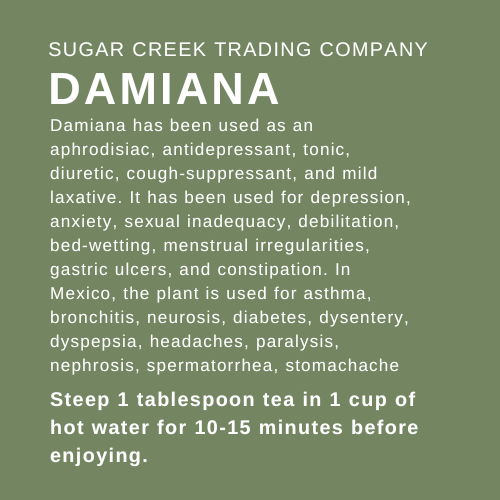Sugar Creek Trading Company
Damiana
Damiana
Impossibile caricare la disponibilità di ritiro
Turnera Diffusa
Damiana is a small shrub that grows 1-2 m high and bears aromatic, serrate leaves that are 10-25 cm long. Small yellow flowers bloom in early to late summer which are followed by small fruits with a sweet smell and fig-like flavor. The medicinal part of the plant is its leaves, which are harvested during the flowering season. Damiana is found throughout Mexico, Central America, and the West Indies, as well as in parts of South America. Turnera diffusa and T. aphrodisiaca are generally regarded as the same plant in herbal commerce. A closely-related species, T. ulmifolia, is similar in appearance, but it has different traditional medicinal uses. The botanical Latin name of the plant, Turnera aphrodisiaca, describes its ancient use as an aphrodisiac.
Damiana was recorded to be used as an aphrodisiac in the ancient Mayan civilization, as well as for "giddiness and loss of balance." A Spanish missionary first reported that the Mexican Indians made a drink from the damiana leaves, added sugar, and drank it for its purported power to enhance lovemaking.
Damiana has a long history of use in traditional herbal medicine throughout the world. It is thought to act as an aphrodisiac, antidepressant, tonic, diuretic, cough-suppressant, and mild laxative. It has been used for such conditions as depression, anxiety, sexual inadequacy, debilitation, bed-wetting, menstrual irregularities, gastric ulcers, and constipation. In Mexico, the plant also is used for asthma, bronchitis, neurosis, diabetes, dysentery, dyspepsia, headaches, paralysis, nephrosis, spermatorrhea, stomachache, and syphilis. Damiana first was recorded with aphrodisiac effects in scientific literature over 100 years ago.
From 1888 to 1947 damiana leaf and damiana elixirs were listed in the National Formulary in the United States. For more than a century damiana's use has been associated with improving sexual function in both males and females. Dr. James Balch reports in his book Prescription for Nutritional Healing that damiana "relieves headaches, controls bed-wetting, and stimulates muscular contractions of the intestinal tract. . . ." The leaves are used in Germany to relieve excess mental activity and nervous debility, and as a tonic for the hormonal and central nervous systems. E. F. Steinmetz states that in Holland, damiana is renowned for its sexual-enhancing qualities and its positive effects on the reproductive organs. The British Herbal Pharmacopoeia cites indications for the use of damiana for "anxiety neurosis with a predominant sexual factor, depression, nervous dyspepsia, atonic constipation, and coital inadequacy."
Damiana's chemical composition is complex and its components have not been identified completely. The leaves contain up to 1% volatile oil that is comprised of at least 20 constituents (including 1,8-cineole, p-cymene, alpha- and beta-pinene, thymol, alpha-copaene, and calamene). Damiana leaves also contain tannins, flavonoids, beta-sitosterol, damianin (a brown, bitter substance), and the glycosides gonzalitosin, arbutin, and tetraphyllin B. Damiana has been reported to be non-toxic in humans and animals.
The main constituents of damiana include: Albuminoids, alpha-copaene, alpha-pinene, arbutin, barterin, beta-pinene, beta-sitosterol, calamenene, caoutchouc, chlorophyll, 1,8-cineole, cymene, cymol, damianin, essential oil, gamma-cadinene, gonzalitosin-i, hexacosanol-1, luteolin, quinovopyranosides, tannins, tetraphyllin b, thymol, triacontane, and trimethoxyflavones.
Other Properties/Actions Documented by Traditional Use: anti-anxiety, antidepressant, antiseptic, antispasmodic, cough suppressant, aperient (mild laxative), astringent, bitter digestive stimulant, diuretic, expectorant, hormonal, nervine (balances/calms nerves), tonic (tones, balances, strengthens overall body functions)
Cautions: May reduce the absorption of iron.
Traditional Preparation: The traditional remedy calls for 2-4 g of dried leaves infused in a cup of boiling water; 2-3 cups are taken daily. Alternatively, 2-4 ml of a liquid extract or 3-4 grams of powdered leaf in tablets or capsules taken twice daily can be substituted if desired.
Contraindications:
Damiana has demonstrated mild hypoglycemic effects in animals. Persons with diabetes and hypoglycemia should use this plant with caution, as blood sugar levels should be monitored accordingly for this possible effect.
Damiana has a traditional use as an abortive and is contraindicated during pregnancy.
This information is gathered directly from: https://rain-tree.com/damiana.htm
Condividere

